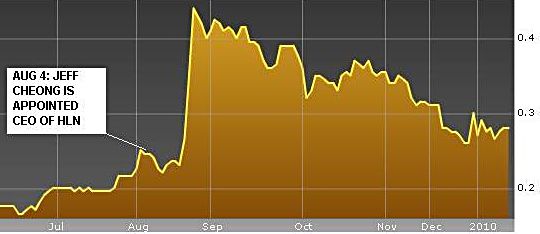 CEO at 28: Jeff Cheong Weixiong.
CEO at 28: Jeff Cheong Weixiong. NextInsight photo
AT 28, Jeff Cheong Weixiong has recently become the youngest CEO of a Singapore-listed company. His appointment was announced by HLN Technologies on Aug 4, and the company’s stock has jumped nearly 100% in the past week.
Jeff's mandate is to drive a sea change in its business model - but, first, it needs the approval of the Singapore Exchange and, possibly, shareholders at an EGM.
To learn more about his plan and background, NextInsight met up with Jeff last Friday (Aug 28).
After graduating from Temasek Polytechic, he worked about a year at Phillip Securities as a dealer, earning less than $1,000 a month after deducting his contribution to his Central Provident Fund account and after deducting his cost of participation at roadshows to attract people to open trading accounts.
After gaining some experience, he decided to venture into institutional sales at Westcomb. At that time, Westcomb was very active in bringing out IPOs, and he leant a lot from being involved in many areas.
Two years later, DBS Vickers Securities gave him a manager’s job to serve high networth investors and corporations in the sale of shares, placements and structured products.
Backing of new controlling shareholder with 29.1% stake
His star was rising rapidly and when he moved to Kim Eng Securities in October 2007 at the age of 26, he became a senior vice president. He did some multi-million dollar deals involving shares of companies such as HLN and Man Wah Holdings.
He began to travel often to Hong Kong to service clients, enlarging his network of contacts all this time. Then came a proposal he couldn't refuse. “I was asked if I would like to do something different and on a different scale,” he said.
Jeff spoke with HLN’s CEO, Leslie Wa, and suggested that the company venture into something more profitable than its existing manufacturing business (HLN suffered a $2.29 million loss in the first half of this year, most of which was impairment loss).
Jeff introduced Leslie to an investor, who subsequently bought a block of shares from Leslie, HLN executive director Ng Khoon Seng, and a shareholder, Bobby Lim, in July this year.
The investor, China Infrastructures Global Investment Capital, acquired in all a 29.1% stake (of which 21.45% came from Leslie), and with its backing, Jeff was appointed by the board as CEO to restructure the company. Jeff said he doesn’t own any share of HLN.
Leslie stepped down to become HLN's chief operating officer to run the industrial business, and currently owns a 7.06% stake in the company.
While HLN is focused on venturing into a new business area, it is not desperate to sell its industrial business. It will do so in due course when the price is right, said Jeff.

HLN now has $10 million net cash to embark on its new investment business in equities, and other assets that could give a good return.
In addition to that, HLN envisages setting up 100%-owned subsidiaries for boutique fund managers to manage their clients’ money. HLN will collect a management fee from these fund managers.
Why would these fund managers join HLN?
“It’s for credibility in order to scale up. We are a listed company, after all.
"Second, with my experience, I am able to introduce and refer deals to the fund managers – not just in HK but also the region - such as IPOs, placements, pre-IPOs, anything.
”When the funds perform, their asset under management grows, we collect higher fees from them. People ask if this is a more risky business. Actually, we are turning to safer ground, and the reward is even higher.”
HLN itself won’t manage investors’ money directly. With the management fee it collects from fund managers, HLN will invest in various assets.
HLN will also have another subsidiary, a consultancy, to advise fund managers, and refer deals to them. The consultancy will be another revenue stream for HLN.
Yet another area of business that HLN is eyeing is stockbroking in Hong Kong. This business is synergistic to the rest of the new HLN model as it can provide low commission rates to the fund managers and at the same time taget the big markets in Hong Kong and China.
There is no other Singapore-listed company like this. The closest would be a few investment holding companies such as Transpac and Plato Capital but they don’t have all these components of HLN's new business model.
Incidentally, Plato Capital announced last Friday (Aug 28) of its proposed US$10 m investment in a joint venture fund targeting to raise US$23 million at the first closing of the fund with co-Investors and Gareth Lim (US$1 m), the son of the chairman of Plato.



